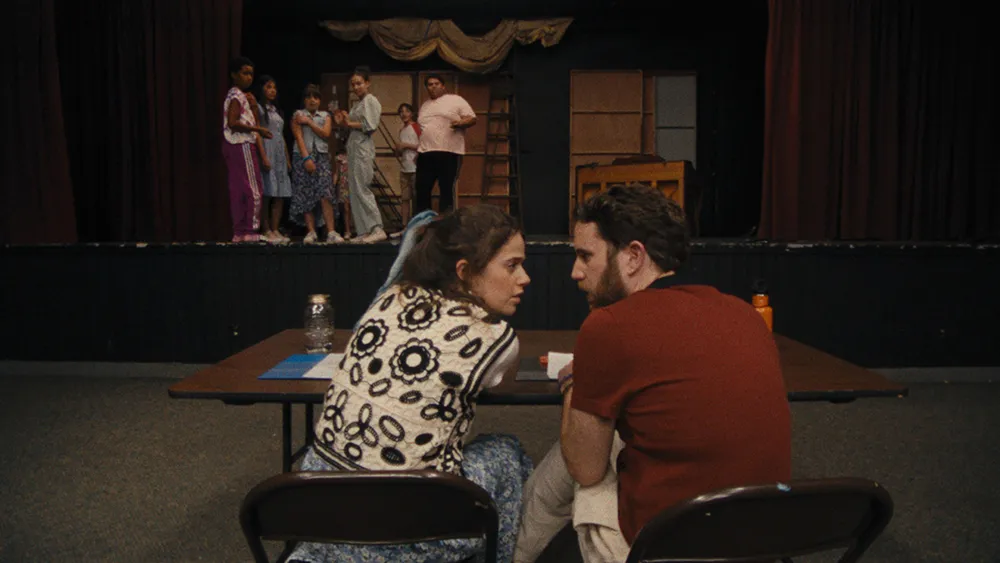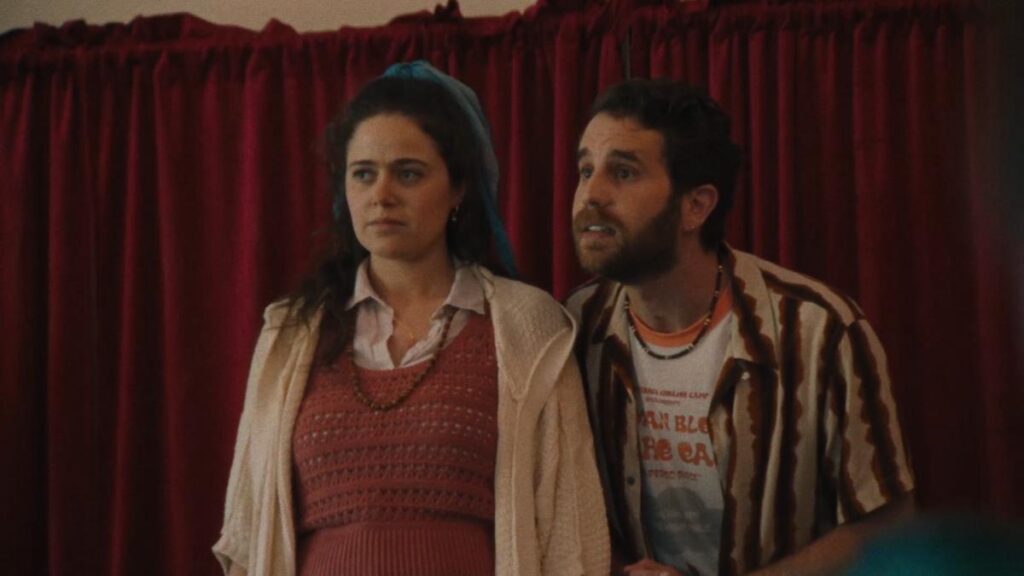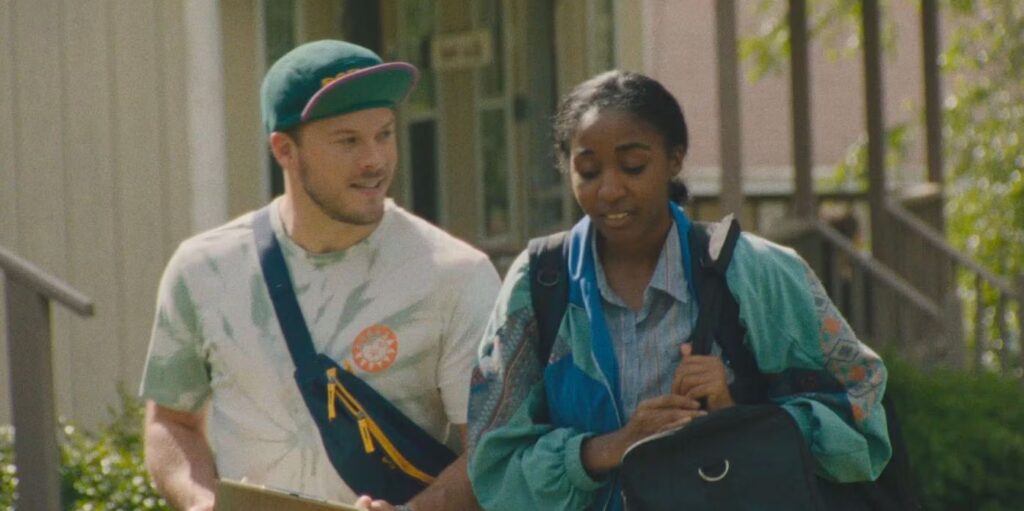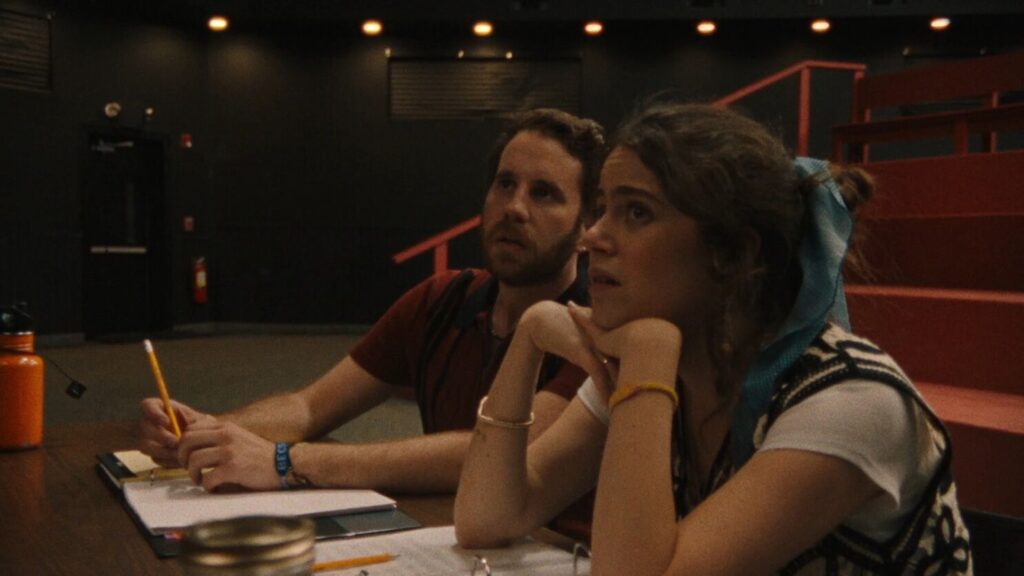
We always mock theater kids, but what about theater grown-ups? Surely these hopeless children—these dorks who walk around quoting Rent and hogging spotlights and mystifying everyone outside their own tragic clique—weren’t born as social misfits. Someone made them this way.
Theater Camp, the spry and winning new comedy directed by Molly Gordon and Nick Lieberman, gently considers the guileless monsters responsible for our ongoing national nightmare of dramaturgical enthusiasm. It posits, with persuasive clarity and disturbing specificity, that passion for the performing arts is an inherited phenomenon—a disease passed down not through genetic material but via seasonal exhortations from the similarly afflicted. You know the saying: Those who can’t get into Juilliard teach how to obsess about getting into Juilliard.
Set in upstate New York (the titular destination is painfully called “AdirondACTS”), Theater Camp structures itself as a mockumentary; for no discernible reason, an offscreen camera crew has resolved to chronicle one crazy summer of auditions, rehearsals, and renditions. Aside from a few cleverly placed title cards—one new instructor, a low-key hustler played by the suddenly ubiquitous Ayo Edebiri, is introduced with the handy label, “Lied on her résumé”—the gimmick rarely pays off. But even if it’s unnecessary, the approach subtly deepens the film’s absorbing, nigh-unnerving authenticity. Gordon and Lieberman, who also wrote the script along with Ben Platt and Noah Galvin, are plainly drawing from personal experience, to the point where Theater Camp at times feels less like a movie than an exorcism.

The play may be the thing, but cinema is a different beast from theater—a fact Gordon and Lieberman often struggle to grasp. Adapting their 2020 short, they’re both making their first feature (Lieberman previously directed several of Platt’s music videos), and visually speaking, it shows; they direct like, well, actors. The handheld camera is often wobbly, the framing is slack, and the aesthetic is less vérité than vacuous.
Still, once you accept Theater Camp on its sloppy DIY terms, you become vulnerable to its undeniable charms—its fleet pacing, its self-lacerating humor, its unsettling sense of immersion. You transform, in other words, into one of the keen young camp attendees who regard their fanatical instructors with a mixture of admiration, trepidation, and bewilderment. These adults take their duty as artistic educators with the utmost seriousness, which explains why they’re all a complete mess.
The standard-bearers for this demented gusto are undoubtedly Amos and Rebecca-Diane, played respectively by Platt and Gordon as a pair of drama teachers whose acting tribulations as adolescents led them to form an inseparable, unhealthily close bond. (“We aren’t codependent,” they clarify, “we just depend on each other.”) Failed professionals, they channel their shared frustrations into their pupils (don’t you dare try slipping faux tears past them), exhibiting a zeal that’s both alarming and oddly aspirational. Say what you want about these weirdos—at least they care.

Amos and Rebecca-Diane’s fervor places them in marked contrast with Troy (Jimmy Tatro, the original American Vandal), our surrogate of sorts whose mother (a briefly glimpsed Amy Sedaris) previously administered the camp before suffering a seizure and falling into a coma while watching a middle-school production of Bye Bye Birdie. Troy’s pursuits veer toward modern rather than classical—he’s a cryptocurrency enthusiast, as well as a social-media personality who works with a cohort called the Founding Ballers—but he nonetheless resolves to run the facility in his mother’s stead, and to learn its peculiar traditions and vocabulary. When Glenn, the overworked tech guy (played by Galvin) who’s constantly running around with a walkie-talkie and basically keeping things afloat singlehandedly, explains to Troy that a non-musical is called a straight play, he earnestly responds, “Then what’s a gay play?” (The axiomatic answer: a musical.)
That’s a funny exchange in a very funny movie, but the key to Theater Camp’s comedy is that it respects its characters’ sincerity while also acknowledging their absurdity. The film is naturally steeped in stage culture—there are nods to Les Misérables and Yankee Doodle Dandy and “Defying Gravity” (Troy watches auditions in befuddlement until a camper busts out a Post Malone hit, at which points he boisterously sings along)—but it doesn’t flatter its audience with nonstop references or winking in-jokes. It instead concocts a buoyant atmosphere that’s both cloistered and inviting. It wants you to join in.

Not everyone is in such a welcoming mood. The screenplay contrives a slobs-versus-snobs plot in which a rival site (embodied by Patti Harrison) threatens the camp with what amounts to a hostile takeover. This kind of putative tension is arguably inconsistent with Theater Camp’s cheerfully low-stakes vibe, but the movie doesn’t take it too seriously, instead drawing its power (and its pleasure) from its lived-in performances. Platt’s arrested career turned into a punch line when he stumbled with Dear Evan Hansen, but he’s perfectly in his element here as a guy whose intensity outstrips his talent, while Gordon quietly bears the burden of being more gifted than her peers. For his part, Tatro lends Troy a sweetness that mitigates his adorable cluelessness. (As for Edebiri, she’s underused, but I’m still savoring her line reading, “Does anybody have an answer that’s not poetry?”)
Not all of the jokes in Theater Camp land—an awkward scene featuring the great David Rasche feels like a missed opportunity—but like the best sleepaway sojourns, it manages to impart a modicum of knowledge while mostly just cultivating a good time. And if every stage show hinges on its finale, the movie is a true crowd-pleaser, delivering an inspired climax that’s both hilarious and genuinely moving. It’s a fitting tribute to these lovable losers who pour their collective heart and soul into their annual low-wattage productions. They may just be passing time in a ramshackle auditorium, but to them, that pitiful stage is all the world.
Grade: B
Jeremy Beck is the editor-in-chief of MovieManifesto. He watches more movies and television than he probably should.
